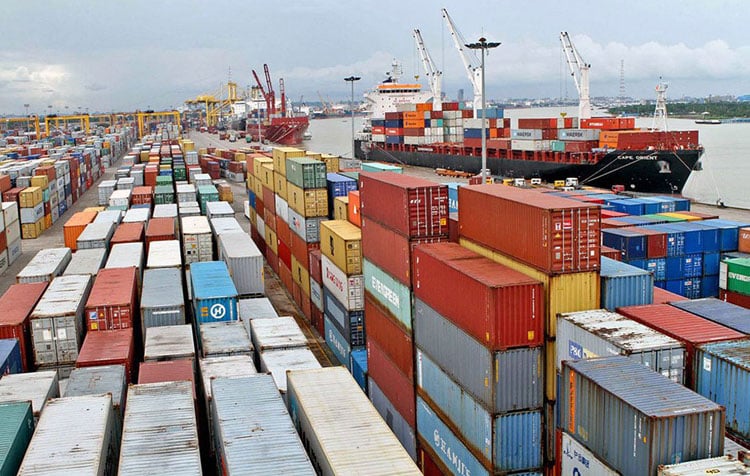The debate over awarding the port handling contracts to the local or foreign firms heats up with the interim government, adamant to bring an efficiency by engaging world’s top port operators, bashing pro-domestic critics and their counter-attack.
The interim government is trying to hand over the operations of New Mooring Container Terminal of the Chattogram Port to a foreign operator, possibly to UAE-based DP World, the sixth largest port operator of the world.
The planned port leasing to a foreign operator is risky from the sovereignty terms, said critics and the interim government’s Chief Adviser Professor Muhammad Yunus called to “resist” them.
Professor Anu Muhammad, a pro-national interest activist economist, at an open discussion titled “Why Leasing Chattogram Port to a Foreign Company Is Risky?” in the capital on Saturday describe Chief Adviser’s call to “resist” those opposing the decision to hand over a terminal at Chattogram Port to a foreign company as the “language of autocracy.”
“The call made by Chief Advisor Professor Muhammad Yunus to resist opponents is contrary to democratic practice and deeply unfortunate,” said Anu Muhammad.
The discussion event was organised by the Democratic Rights Committee, with Professor Anu Muhammad presiding.
During the discussion, it was highlighted that the terminal in question has been successfully operated for the past 17 years by a domestic company. Though the terminal has an annual container-handling capacity of 1 million units, it handled 1.281 million units last year. Nevertheless, in line with decisions taken during the previous Awami League government, the
current caretaker administration is moving to hand over the terminal to a foreign company.
A process is underway to directly lease out the terminal on a government-to-government (G2G) basis, under a Public-Private Partnership (PPP) model, to DP World — the world’s fifth-largest terminal operator based in the United Arab Emirates. This move has sparked protests and demonstrations for a long time among port workers and various concerned groups.
Professor Anu Muhammad said, “Declaring that those raising questions must be ‘resisted’ reflects an autocratic mindset. In a country where people advocate for democracy, transparency, and national interest, their voices should not be silenced.”
He added, “Just as previous governments attempted to suppress dissent over projects like Rampal and Rooppur, the current advisor is using the same language.”
Criticising the decision to hand over such a critical port facility without a tender, he remarked, “Handing over the management of such an important port to foreign hands without a tender will remain a distressing precedent. Regardless of the opinions of the US ambassador or the World Bank, no decision should be made without a transparent and accountable national process.”
He also announced that a road march program would be held on June 27 and 28 as part of the protest against the leasing process.
Other speakers at the event included writer and researcher Maha Mirza, Kallol Mostafa, and former CBA General Secretary of Chattogram Port, Sheikh Nurullah Bahar.
What experts say
Bangladesh Inland Container Depots Association Secretary General Ruhul Amin Sikder Biplob told TIMES of Bangladesh top international port operators can significantly improve the port situation with automation and efficiency.
Ships waiting time is 3 days on average in Chattogram Port, which a world-class operator can reduce to 24 hours.
“The port inefficiency is unacceptable for a thriving economy like Bangladesh,” he said, we need a massive boost.”
“Port operations by a foreign operator alone never can be a threat to national sovereignty,” he believes.
Many of the top internationally reputed port operators participated in the repeated tenders in the early 2010s and surprisingly the tenders were cancelled, allowing the local operator Saif Powertec to continue with its “inefficient” way, said Biplob.
“What the operator is investing in and taking away how much of the revenue is a crucial information, alongside other clauses of the contracts,” Transparency International Bangladesh Executive Director Iftekharuzzaman told TIMES of Bangladesh.
He stressed awarding contracts through a competitive process and make the contract clauses public for the sake of transparency amid the heating up debate.


